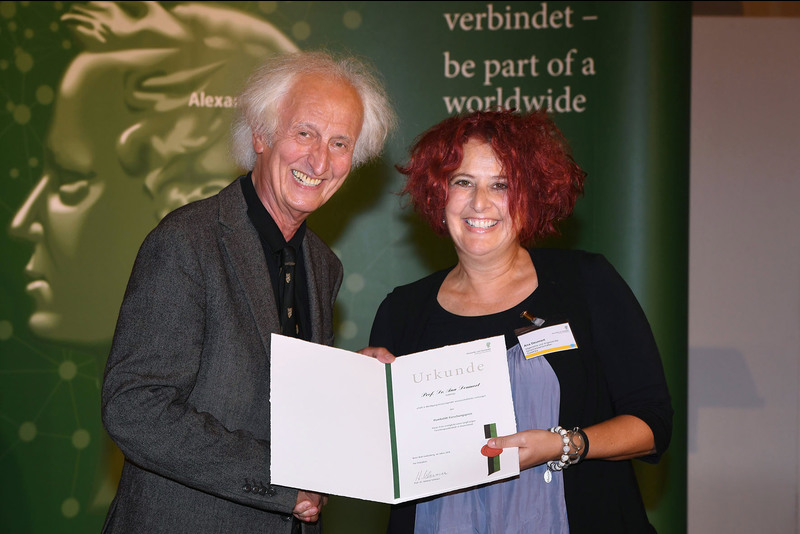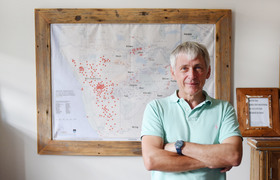Honour for innovative, multifaceted linguist
29 August 2017 | Story Helen Swingler. Photo Supplied.
Professor Ana Deumert was in Berlin recently to receive the prestigious Humboldt Research Award for her work in general and applied linguistics. Her peers have described her as one of the world’s most distinguished and innovative thinkers in the field of sociolinguistics.
Deumert heads up the Linguistics Section of UCT’s School of African and Gender Studies, Anthropology and Linguistics, and is currently also acting director of the school. The awards ceremony, which coincided with the annual meeting of the Humboldt Foundation in Berlin, presented an opportunity for Deumert’s collaborators and peers to affirm her work and acknowledge her many contributions to the field.
The Humboldt award is also about research partnerships with German universities. Deumert has long-standing collaborations with colleagues at the University of Cologne and, more recently, at the University of Hamburg.
The award will primarily support her multifaceted research projects with the University of Cologne’s Anne Storch, professor of African studies, and Christiane Bongartz, professor of English linguistics.
Deumert had shaped the field in new ways, they wrote in their laudation. An excerpt reads: “An outstanding sociolinguist, she has devoted her international career to a constructive re-envisioning and, one can say, reinvention of the entire field and with it our understanding of it … her proposals are characterised by their originality and timeliness: issues such as mobility in a globalised world or linguistic creativity get blended and re-amalgamated to offer new insights about how we use language in an age where social interaction has taken many modes and has become increasingly independent of where people are, as well as more dependent on access to new media and technologies.”
The laudation continues: “Professor Deumert’s perspective encompasses the small and the big picture simultaneously, enabling her to offer astute observation from a lucid and well-motivated postcolonial stance.”
Storch and Bongartz also noted Deumert’s prolific output as well as the broad scope of that work, which mirrored her interest in the “mobilities of speakers, of language, of epistemes and speech”, an approach to sociolinguistics and language that is both pioneering and outstanding in terms of methodology and theory making.
“Here she provides innovative theoretical approaches to sociolinguistics that will have a lasting impact on the discipline.”
Deumert’s research spans the gap between academia and the daily lives of people, they wrote. She has also been active in disseminating her work beyond academic publications: talks, social engagement, networking and editing within a “huge interdisciplinary network”.
Her contributions to mobile communication, linguistics and critical theory are inspiring a new generation of young sociolinguists. Her last book, Sociolinguistics and Mobile Communication (2014), was about the impact of digital media on language, and argued that studying digital communication contributes to a better understanding of what language is, and what language can be.
First trained in history and literature, Deumert came to linguistics from a less direct route. It was precisely this non-disciplinary academic background in history and literary theory that allowed her to imagine a linguistics beyond structures and rules: “I’m very interested in creativity, language and art, which goes back to my literary background. I enjoy thinking about the workings and minutiae of language; not necessarily the plot but the way the author uses language creatively, pushing the boundaries of what grammar deems possible.”
Colonialism and revolution
The legacy of colonialism looms large in the field of linguistics and Deumert is currently working with Storch on a book project that will show how the legacies of colonial thinking underpin the discipline and shape linguistics today.
“The first step in decolonising linguistics is to recognise and acknowledge the colonial epistemes it carries and to deconstruct and unpack them. Many disciplines were entangled in the colonial project. The question is: How do we move out of the colonial project which has shaped the discipline?”
The Humboldt award will also support “a project that goes in a different direction”. This is Deumert’s planned monograph with the working title “Language and Revolution”. The monograph will look at the role of language in revolutions throughout history, including the French, Haitian and Russian revolutions; the South African liberation movement; the 1968 revolution in France; as well as current student-led movements and sociopolitical activism, globally.
“All revolutions imagine a different world, a utopia, a better world for which you fight, and language has a particular space in that world. What was the role of language in revolutions and how did people envisage language in a liberated society? So, I’m looking at the idea of revolution and its relevance to linguistic theory.”
In a project with the University of Hamburg, the focus will be on a particular type of sociopolitical activism: antiglobalisation. The 2017 G20 Hamburg summit sparked intense antiglobalisation protests in the city. As part of her research, Deumert is keen to interview antiglobalisation activists from across the world.
At the recent 18th World Congress of the International Association of Applied Linguistics in Rio de Janeiro, which attracted a huge international audience, South African researchers made a strong impact. Deumert believes that the Global South can make an essential contribution to the development of linguistic theory: “Some of the best papers at the conference were from South Africa. We were visible and we really produced good work for a very demanding international audience.”
 This work is licensed under a Creative Commons Attribution-NoDerivatives 4.0 International License.
This work is licensed under a Creative Commons Attribution-NoDerivatives 4.0 International License.
Please view the republishing articles page for more information.










